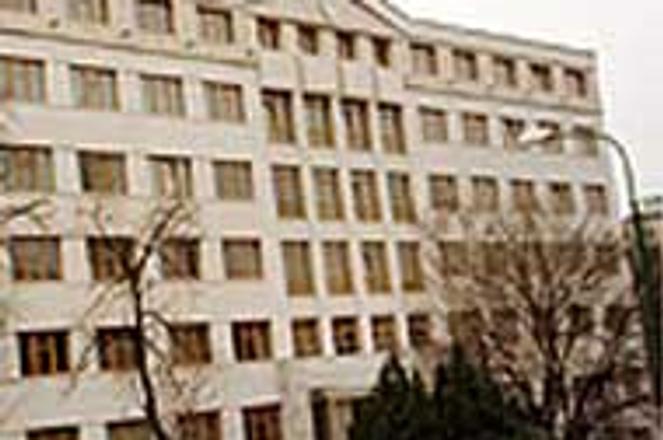The Ministry of Foreign Affairs moved to a new headquarters in 1998 - a building which used to house the communist central committee.photo: TASR
If the path to western European and trans-Atlantic organisations depends heavily on high-profile diplomacy, the current Slovak government would seem to be well on its way to success.
Since the 1998 election, the international status of Slovak diplomacy has risen rapidly.
In late April, Minister of Foreign Affairs Eduard Kukan was named by UN Secretary General Kofi Annan as his special envoy for finding a peaceful solution to the Kosovo crisis. In June, Slovak diplomat Ján Kubiš became chairman of the Organisation for Security and Co-operation in Europe (OSCE). In mid-October, Slovakia is going to run against the Ukraine for a non-permanent seat on the UN Security Council. The former "black hole of Europe," as Madeleine Albright labelled Slovakia in 1997, is by most accounts on a positive track towards the EU and NATO.
But according to insiders at the Slovak Ministry of Foreign Affairs (MFA), there are still some pressing problems within the ministry that need to be fixed. Because of low salaries, they say, many talented young people are choosing to work in the private sector rather than at the ministry. Politically important embassies are not being properly prioritised, they add. In addition, a 10% mandatory cut in labour costs at government ministries this year will result in staffing cuts, according to ministry spokesman Marián Masarík.
According to the MFA Press Department, Slovakia has 60 embassies in foreign nations and seven additional embassies to international organisations such as the UN or NATO. There are about 500 MFA employees working in Bratislava, and another 250 MFA diplomats permanently working abroad. An additional 250 diplomats work in diplomatic missions; these people are not officially members of the Ministry, but are politicians, businessmen, scientists, and other professionals.
One difficulty at the ministry is the political in-fighting which mars the Slovak diplomatic scene. At some Slovak embassies, diplomats named by the former Mečiar government are still working, for example in Warsaw (Ondrej Nemčok) and Italy (Rudolf Zelenay). The continued presence of Mečiar-era diplomats can cause rifts, such as an incident last November when Nemčok failed to welcome Prime Minister Mikuláš Dzurinda at the Warsaw airport on an official state visit.
The Slovak press has reported rumours that although Minister Kukan would like to see these officials changed, President Rudolf Schuster, who must confirm each ambassadorial recall and appointment, has said that diplomats should not be punished because of their ties to the former government.
In terms of embassy staffing, some inside the MFA argue that embassies with great political importance, such as those to the EC and to NATO, to the United States and Russia, should have more staff than those in less-pivotal nations.
But in practice, all embassies are treated more or less equally, and given similar budgets for staffing, said one high-ranking MFA official who asked not to be named. "The Slovak embassy to Zimbabwe has on paper the same importance as our embassy to the US," he said.
Masarik denied this accusation, saying that Slovak embassies abroad "are assigned different priorities based on Slovakia's foreign policy [goals]."
Low salaries are also a problem, the ministry source said, adding that the MFA is finding it hard to attract enough western-educated young people.
"Slovak diplomats hold an unfortunate record. Their salaries are the lowest among all the Visegrad countries- Poland, the Czech Republic and Hungary," he said. In the business world, he added, educated and skilled workers can "easily make three to ten times higher incomes than they can at the ministry."
Deputy Foreign Minister Ján Figeľ confirmed for The Slovak Spectator that low salaries were a problem at the ministry.
The source also said that ministry employees are given too little funding to attend international conferences, professional development courses, and other events.
Again, the suggestion that ministry employees do not receive adequate training was denied by Masarik, who listed co-operation with the Vienna and London Diplomatic academies as well as Oxford University in defending the educational opportunities open to Slovak Foreign Ministry employees.
The sector of the NGO world which deals with foreign policy is also complaining about a money shortage. The Slovak Institute for International Studies, for example, says it is struggling with funds. On September 9, the NGO - which is linked to the MFA and organises events and projects dealing with foreign policy and integration issues - released its latest project, an index of Slovak institutions dealing with Slovak foreign policy. But SIIS head Urban Rusnák said he was unsure of what his association could do next.
"What the next step will be after this paper index, I don't know," he said. "The money shortage has a deep impact on our activities, and we have to look at all possible sources for funds, mostly from abroad."


